Ed Gorman's Blog, page 178
December 3, 2011
Scandal On The Sand by John Trinian
Reprinted from 2007
SCANDAL ON THE SAND by John Trinian
John Trinian was a working name of Zekial Marko. He was a former
> convicted criminal who started publishing when he got out of jail
> in the early sixties. His first novel was under his real name
> (Scratch a Thief, Fawcett Gold Medal 1961, also as Once a Thief),
> after which he started using the pseudonym. As Trinian, he
> published five or six novels with various paperback houses, such
> as Pyramid.
>
> Scratch a Thief is an excellent novel, you should try it. That's
> the only book I've read by him, sadly, so I can't comment on the
> others. >
> Juri Nummelin (on Rara-Avis)
Ed here:
Further information on Trinian has him writing for The Rockford Files and other TV shows. While I don't think he was as good as Malcolm Braly, another Gold Medal author who served hard time, I do think his novels had both a lyrical and sexual aspect that we don't find in most of Braly.
I just finished Trinian's SCANDAL ON THE SAND (1964) and I have to say that it offers just about everything I ask for from a novel. A unique story, a strong voice, a definite worldview and several compelling characters, most notably the rich young woman at the book's center, Karen Fornier.
A dying killer whale washes up on a stretch of deserted Southern California beach. Karen, hungover and dismal that she finally gave into the childish wanna-be macho man Hobart, the one her parents would like her to marry...she leaves their beach motel hoping to lose him. Wandering along the beach she finds the whale and for her its appearance is almost religious. The way she bonds with it is moving and is a credit to Trinian's skill.
Hobart insists that the whale is dead and should be cut up for cat food. He finds a sinister, arrogant young cop, Mulford, who agrees with him. Mulford orders a tow truck to come in and drag it away. He then orders Hobart and Karen to leave the area. Hobart sees in the harsh machismo of Mulford everything he's secretly wanted to be, that not even his considerable inheritance could buy him. He sides with Mulford and tries to drag Karen away. But she defies them both and stays. Not even when the whale proves to be alive will Mulford stop the tow truck. He says he'll shoot the whale.
All this is being observed from close-by a hood named Bonniano who is to meet a runner who will give him enough money to escape to Mexico. Bonniano is in the news for being a hit man who last night iced a prominent mob figure. Everybody's looking for him.
These and others play into the story of whale on the beach. The character sketches show the influences of Sherwood Anderson and John O'Hara and the cutaways to life on the beach bring the 1964 era alive. Boys wearing white clam digger pants--girls lying about in pink bikinis with transistor radios stuck to their ears--and just about everybody managing to grab themselves a little marijuana whenever the opportunity comes up...all this being the lull before the flower power storm that was less than two years away.
A cunning little book. rinian was the real deal.
A Note from a reader:
Anonymous said...
Marko was one of the best friends I've ever had. We ran together in Marin County and Sausalito in the early to late Sixties. He was never a criminal, much less convicted of anything. This is all myth-making, maybe even by Marko himself. After all, he not only wrote under John Trinian, he made up the name "Zekial Marko." Zekial he picked out of the Bible, Marko was because he felt he was a gypsy. His real name was Marvin Smucker. You can see why he changed it. He was born in 1931 and his mother lived in San Bruno. He wrote House of Evil starring me and him. He was Paul Berko. I was Anne Woodbridge. And I was there for the entire writing and making of Once A Thief. So please, forget the criminal nonsense. I do wish I could find him. That's why I ran across this. Looking for Marko.
Might as well this as Anne.
SCANDAL ON THE SAND by John Trinian
John Trinian was a working name of Zekial Marko. He was a former
> convicted criminal who started publishing when he got out of jail
> in the early sixties. His first novel was under his real name
> (Scratch a Thief, Fawcett Gold Medal 1961, also as Once a Thief),
> after which he started using the pseudonym. As Trinian, he
> published five or six novels with various paperback houses, such
> as Pyramid.
>
> Scratch a Thief is an excellent novel, you should try it. That's
> the only book I've read by him, sadly, so I can't comment on the
> others. >
> Juri Nummelin (on Rara-Avis)
Ed here:
Further information on Trinian has him writing for The Rockford Files and other TV shows. While I don't think he was as good as Malcolm Braly, another Gold Medal author who served hard time, I do think his novels had both a lyrical and sexual aspect that we don't find in most of Braly.
I just finished Trinian's SCANDAL ON THE SAND (1964) and I have to say that it offers just about everything I ask for from a novel. A unique story, a strong voice, a definite worldview and several compelling characters, most notably the rich young woman at the book's center, Karen Fornier.
A dying killer whale washes up on a stretch of deserted Southern California beach. Karen, hungover and dismal that she finally gave into the childish wanna-be macho man Hobart, the one her parents would like her to marry...she leaves their beach motel hoping to lose him. Wandering along the beach she finds the whale and for her its appearance is almost religious. The way she bonds with it is moving and is a credit to Trinian's skill.
Hobart insists that the whale is dead and should be cut up for cat food. He finds a sinister, arrogant young cop, Mulford, who agrees with him. Mulford orders a tow truck to come in and drag it away. He then orders Hobart and Karen to leave the area. Hobart sees in the harsh machismo of Mulford everything he's secretly wanted to be, that not even his considerable inheritance could buy him. He sides with Mulford and tries to drag Karen away. But she defies them both and stays. Not even when the whale proves to be alive will Mulford stop the tow truck. He says he'll shoot the whale.
All this is being observed from close-by a hood named Bonniano who is to meet a runner who will give him enough money to escape to Mexico. Bonniano is in the news for being a hit man who last night iced a prominent mob figure. Everybody's looking for him.
These and others play into the story of whale on the beach. The character sketches show the influences of Sherwood Anderson and John O'Hara and the cutaways to life on the beach bring the 1964 era alive. Boys wearing white clam digger pants--girls lying about in pink bikinis with transistor radios stuck to their ears--and just about everybody managing to grab themselves a little marijuana whenever the opportunity comes up...all this being the lull before the flower power storm that was less than two years away.
A cunning little book. rinian was the real deal.
A Note from a reader:
Anonymous said...
Marko was one of the best friends I've ever had. We ran together in Marin County and Sausalito in the early to late Sixties. He was never a criminal, much less convicted of anything. This is all myth-making, maybe even by Marko himself. After all, he not only wrote under John Trinian, he made up the name "Zekial Marko." Zekial he picked out of the Bible, Marko was because he felt he was a gypsy. His real name was Marvin Smucker. You can see why he changed it. He was born in 1931 and his mother lived in San Bruno. He wrote House of Evil starring me and him. He was Paul Berko. I was Anne Woodbridge. And I was there for the entire writing and making of Once A Thief. So please, forget the criminal nonsense. I do wish I could find him. That's why I ran across this. Looking for Marko.
Might as well this as Anne.
Published on December 03, 2011 15:02
December 2, 2011
They never quite became stars
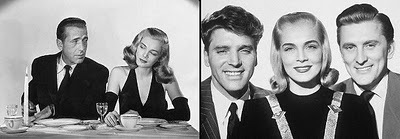
Ed here: I read TCM's Movie Morlocks whenever I get a chance. Recently I found this piece about actors who had a chance to become stars but never quite made it to the big big time. This is a pretty cool piece. Read the whole thing and I think you'll agree. You'll also have some of your own nominees for people who should've made it.
The Stars That Never Shone
Posted by Greg Ferrara on September 28, 2011
Every star started out small. Depending on the time and era of any given star's ascendance they may have done time on stage, television or played bit parts in films working their way up the ladder. The stars that everyone knows, the ones of which even the most casual filmgoer is aware, from Bette Davis, James Cagney and Katherine Hepburn to Peter O'Toole, Robert De Niro and Meryl Streep, are the ones that had not only the talent, not only the charisma, not only the charm but, crucially, the right roles at the right time to make an impression, a big one. Think Dustin Hoffman. A talented actor who, were it not for The Graduate, may have labored as a character actor for years before stardom or, perhaps, never achieved it at all. I think he would have anyway but what do I know? I only know his career from the trajectory it took so any speculation I may have on whether or not he would have become a star without The Graduate is severely biased by that pesky little thing, reality.
But there are other actors who were given the lead role, not once, not twice, but several times and every time, they came up short. Oh, not necessarily in their performances, mind you. The audience simply didn't respond to them, for whatever reason. They were given the opportunity to become a star. They were pushed by the powers that be to hit the big time but they never did. These actors, the stars that never shone, are the actors that fascinate me, at times, more than the stars. What must it be like to get so close only to be pulled away by the unblinking forces of gravity, always tugging, always willing to bring the starry-eyed back down to earth?
Of course, for those it happens to, I imagine there's nothing but gratitude at being given the chance and enjoying a rich, rewarding and successful career filling character roles when the leads dried up. Back in the studio days of Hollywood, stars were crafted and when it didn't work, the actor in question was either relegated to character roles or leads in B pictures. One that comes to mind is Lizabeth Scott. She was given big parts in big films but her brand of charisma never quite took hold enough to become one of the big-time stars. And not for not trying either. In fact, Scott was practically given the keys to the kingdom. After her unsettling, bizarre and off-kilter portrayal of Toni in The Strange Love of Martha Ivers, she received starring roles opposite Humphrey Bogart, Dick Powell and Burt Lancaster. Despite this obvious advantage, she never became a hit with the public as did Barbara Stanwyck, Lana Turner or Veronica Lake. She was a star, all right, but a minor one.
for the rest go here: http://moviemorlocks.com/2011/09/28/s...
Published on December 02, 2011 13:01
December 1, 2011
Forgotten Books: Hardboiled American by Geofrrey O'Brien
Forgotten Books: Hardboiled America
How's this for a resume (from Wikipedia): "Geoffrey O'Brien (b. 1948) is a widely published author, editor, book and film critic, poet, and cultural historian. In 1992, he joined the staff of the Library of America, (later) becoming editor in chief. He has been a contributor to Artforum, Film Comment, The New York Times, Village Voice, New Republic, Filmmaker and, especially, to the New York Review of Books."
With cred like this you might expect his writing to be hoity or at least toity. Nope. No matter what he's writing about O'Brien is a pleasure to read. He has a voice and style all his own. And he's never more compelling than when he's writing about "Lurid Paperbacks and Masters of Noir," the sub-title of Hardboiled America.
There is no equivalent to this study of the largely forgotten writers who were conduits to the present day likes of Lehane and Pelecanos and Zeltserman. Even if these men never read the paperback writers of the Fifties they could not escape their influence. It was everywhere, adapted to radio and movies and comic books. And O'Brien is masterful at tracing the hardboiled vision from generation to generation.
O'Brien takes seriously the writing of such people as Day Keene, Harry Whittington and Brett Halliday and many other paperback men and women. He's opinionated of course. His take on John D. MacDonald and Dorothy Hughes never fails to rankle me. But his observations on the work of Jim Thompson and W.R. Burnett and Ross Macdonald and Charles Williams are eloquent and so well reasoned I reread them several times a year. He also brings in literary writers whose work was sometimes in the spirit of hardboiled. Nelson Algren is a natural. But I'm glad he referenced Calder Willingham, too. A fine novelist whose short stories in particular are so dark they can disturb your sleep for a few nights.
Then there is a checklist of hardboiled novels from 1929-1960. Again there is nothing like this anywhere else. You'll encounter names you've never heard of as well as the paperback staples of the various eras. I was so taken with the checklist I once called O'Brien and asked him if he'd let me reprint it in a coffee table book I was editing on noir. He didn't bother to hide his irritation. His checklist, he said, was one of the selling points of the his book. Why would he let me reprint it? He was right of course. But what the hell, it was worth a try.
If you don't have this book in your collection then you don't have a serious collection. Period. O'Brien is a savvy and witty writer and his words are complemented by a healthy number of black and white paperback cover reproductions. Get this book
posted by Ed Gorman @ 3:21 PM 7
How's this for a resume (from Wikipedia): "Geoffrey O'Brien (b. 1948) is a widely published author, editor, book and film critic, poet, and cultural historian. In 1992, he joined the staff of the Library of America, (later) becoming editor in chief. He has been a contributor to Artforum, Film Comment, The New York Times, Village Voice, New Republic, Filmmaker and, especially, to the New York Review of Books."
With cred like this you might expect his writing to be hoity or at least toity. Nope. No matter what he's writing about O'Brien is a pleasure to read. He has a voice and style all his own. And he's never more compelling than when he's writing about "Lurid Paperbacks and Masters of Noir," the sub-title of Hardboiled America.
There is no equivalent to this study of the largely forgotten writers who were conduits to the present day likes of Lehane and Pelecanos and Zeltserman. Even if these men never read the paperback writers of the Fifties they could not escape their influence. It was everywhere, adapted to radio and movies and comic books. And O'Brien is masterful at tracing the hardboiled vision from generation to generation.
O'Brien takes seriously the writing of such people as Day Keene, Harry Whittington and Brett Halliday and many other paperback men and women. He's opinionated of course. His take on John D. MacDonald and Dorothy Hughes never fails to rankle me. But his observations on the work of Jim Thompson and W.R. Burnett and Ross Macdonald and Charles Williams are eloquent and so well reasoned I reread them several times a year. He also brings in literary writers whose work was sometimes in the spirit of hardboiled. Nelson Algren is a natural. But I'm glad he referenced Calder Willingham, too. A fine novelist whose short stories in particular are so dark they can disturb your sleep for a few nights.
Then there is a checklist of hardboiled novels from 1929-1960. Again there is nothing like this anywhere else. You'll encounter names you've never heard of as well as the paperback staples of the various eras. I was so taken with the checklist I once called O'Brien and asked him if he'd let me reprint it in a coffee table book I was editing on noir. He didn't bother to hide his irritation. His checklist, he said, was one of the selling points of the his book. Why would he let me reprint it? He was right of course. But what the hell, it was worth a try.
If you don't have this book in your collection then you don't have a serious collection. Period. O'Brien is a savvy and witty writer and his words are complemented by a healthy number of black and white paperback cover reproductions. Get this book
posted by Ed Gorman @ 3:21 PM 7
Published on December 01, 2011 10:04
November 30, 2011
7 Hit TV Shows That Have Stayed Too Long at the Party
7 Hit TV Shows That Have Stayed Too Long at the Party
Published: November 29, 2011 @ 7:57 pm
FROM THE WRAP
By Kimberly Potts
This is not a story about ratings. This is a story about shows that have overstayed their welcome.
Shows like "Glee," "House" and "Grey's Anatomy" are still pulling in respectable ratings, but are a shadow of what they once were. For every show like "Freaks and Geeks," "Sports Night" and "Party Down" -- great shows that were canceled too soon -- there are series that risk their ultimate TV legacy by staying too late at the party.
Here's why "Dexter" and six other once-terrific shows are past their prime in primetime.
Also read: Mindy Kaling on 'The Office,' Chest Hair and Sexy Andy Rooney
1. "DEXTER"
That twist in Sunday night's episode -- which we won't spoil in case it's still sitting on your DVR -- gave us pause for a moment. Could this be the thing that turns season six around? Nope … the season's still a mess.
Writers have Dexter Morgan tackling religion and where, or if, it fits into his life.
A guest stint by Mos Def as reformed killer Brother Sam was the highlight of those efforts, but everything else about season six has fallen flat.
That includes the return, sorta, of Dexter's dead serial killer brother; the painfully cheesy therapy sessions for Deb; the embarrassing way the writers have completely decimated Maria LaGuerta; and the mind-boggling reason Dexter has all of a sudden embraced killers like Travis and Trinity's son, Jonah.
Also read: 'Dexter' Renewed for Another 2 Seasons
If "Dexter" had been a lesser show, around season two or three viewers might have started to question the fact that there seem to be an awful lot of serial killers who a) live in Miami and b) always seem to cross paths with Dexter, even outside his police duties.
"Darkly Dreaming Dexter," the novel in which the Dexter Morgan character was introduced, has become "Deeply Disappointing Dexter."
2. "HOUSE"
He's been in jail and rehab. That's fine if you're, say, playing Iron Man. But if you're a doctor, the go-to diagnostician, this is not the resume you want to present to your patients.
Add in the many, many cast changes, and the fact that the show has fallen into a formula of bringing Hugh Laurie's House to the brink of redemption, only to see him embrace his inner jerk once again, and the diagnosis is clear: After this, the show's eighth season, it is most definitely time for "House" to be surgically removed from the Fox lineup.
Also read: 'House' Season 8 Trailer: Watch Hugh Laurie Get Pummeled in Prison (Video)
3. "GLEE"
The first season of the show was something new and different and fun.
The second season … it was kind of like that kid you knew in junior high who came back from summer vacation for the first year of high school and had outgrown his awkward phase.
for the rest go here:
http://www.thewrap.com/tv/column-post...
Published: November 29, 2011 @ 7:57 pm
FROM THE WRAP
By Kimberly Potts
This is not a story about ratings. This is a story about shows that have overstayed their welcome.
Shows like "Glee," "House" and "Grey's Anatomy" are still pulling in respectable ratings, but are a shadow of what they once were. For every show like "Freaks and Geeks," "Sports Night" and "Party Down" -- great shows that were canceled too soon -- there are series that risk their ultimate TV legacy by staying too late at the party.
Here's why "Dexter" and six other once-terrific shows are past their prime in primetime.
Also read: Mindy Kaling on 'The Office,' Chest Hair and Sexy Andy Rooney
1. "DEXTER"
That twist in Sunday night's episode -- which we won't spoil in case it's still sitting on your DVR -- gave us pause for a moment. Could this be the thing that turns season six around? Nope … the season's still a mess.
Writers have Dexter Morgan tackling religion and where, or if, it fits into his life.
A guest stint by Mos Def as reformed killer Brother Sam was the highlight of those efforts, but everything else about season six has fallen flat.
That includes the return, sorta, of Dexter's dead serial killer brother; the painfully cheesy therapy sessions for Deb; the embarrassing way the writers have completely decimated Maria LaGuerta; and the mind-boggling reason Dexter has all of a sudden embraced killers like Travis and Trinity's son, Jonah.
Also read: 'Dexter' Renewed for Another 2 Seasons
If "Dexter" had been a lesser show, around season two or three viewers might have started to question the fact that there seem to be an awful lot of serial killers who a) live in Miami and b) always seem to cross paths with Dexter, even outside his police duties.
"Darkly Dreaming Dexter," the novel in which the Dexter Morgan character was introduced, has become "Deeply Disappointing Dexter."
2. "HOUSE"
He's been in jail and rehab. That's fine if you're, say, playing Iron Man. But if you're a doctor, the go-to diagnostician, this is not the resume you want to present to your patients.
Add in the many, many cast changes, and the fact that the show has fallen into a formula of bringing Hugh Laurie's House to the brink of redemption, only to see him embrace his inner jerk once again, and the diagnosis is clear: After this, the show's eighth season, it is most definitely time for "House" to be surgically removed from the Fox lineup.
Also read: 'House' Season 8 Trailer: Watch Hugh Laurie Get Pummeled in Prison (Video)
3. "GLEE"
The first season of the show was something new and different and fun.
The second season … it was kind of like that kid you knew in junior high who came back from summer vacation for the first year of high school and had outgrown his awkward phase.
for the rest go here:
http://www.thewrap.com/tv/column-post...
Published on November 30, 2011 12:49
November 29, 2011
Patricia Cornwell: 'Powerful women are more likely to kill'
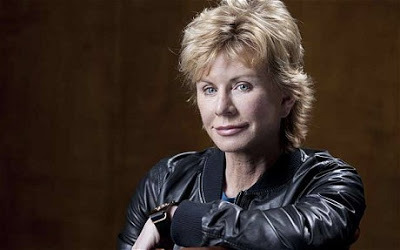
FROM THE TELEGRAPH UK
Patricia Cornwell: 'Powerful women are more likely to kill'
Patricia Cornwell, the doyenne of crime fiction, explains why her new book is filled with female psychopaths.
'Red Mist' is Cornwell's 19th book to feature Kay Scarpetta, who Angelina Jolie has signed up to portray in a forthcoming film Photo: ANDREW CROWLEY
By Bryony Gordon7:30AM GMT 29 Nov 2011 40 Comments
IIt isn't giving too much away to reveal that all of the criminals in Patricia Cornwell's new book – and there are several – are female. There is one who hammers nails into a child's head, another who is a convicted sex offender, and a woman on death row for murdering a family as they slept. Then there is the mother who smothers her children and – my personal favourite – the woman who condemns her victims to long and painful deaths by Botox (she injects food with the botulinum toxin). Meanwhile, men are reduced to mere walk-on roles, emasculated, castrated – not literally, though this process does appear in other
Cornwell novels – and cast as helpless husbands and ineffectual police officers.
Red Mist is Cornwell's 19th Scarpetta novel, the one that will nudge her over the magical 100 million copies mark. It is also the book that coincides with her work finally hitting the big screen. Angelina Jolie has signed up to play Cornwell's protagonist, Dr Kay Scarpetta, a former chief medical examiner of the state of Virginia and forensic consultant.
In previous novels Scarpetta has dealt with sexual sadists and serial killers who leave limbless corpses, but none have featured quite so many female psychopaths. The main killer in Red Mist poisons her victims, which Cornwell tells me "is very female". She says this in a cool, clinical manner, matter-of-factly, as if poisoning people was the most natural thing a woman could do after having periods and growing breasts (I suppose this detachment must be what happens when you have worked in a morgue, spent much of your time shadowing forensics experts and frequently attended autopsies, as Cornwell has.) "[Poisoning is] a long, drawn-out death, so it's diabolical, sadistic, psychological, which is a female thing. It's an inversion of the maternal instinct to nurture."
for the rest go here: http://www.telegraph.co.uk/culture/bo...
Published on November 29, 2011 13:07
November 27, 2011
New Books: Cemetery Girl by David Bell

Cemetery Girl tells the story of Tom and Abby Stuart. They are a perfect couple with good jobs, a nice home, and a beautiful twelve-year-old daughter named Caitlin. Everything is great in their lives until the unthinkable happens—one day Caitlin goes out to walk the family dog, and she doesn't come home. When the book begins, Caitlin has been gone for four years, and Tom and Abby are facing a dilemma that the loved ones of missing people face all the time: Do we move on and accept that our child isn't coming back? Or do we keep hope alive against all odds and never give up or let go?
I started writing this book because I think one of the most terrifying things a person can encounter in life is the unknown, especially as it relates to those closest to us. What could be more frightening than having someone very close to you who harbors a secret they won't share? What could be more frightening than having someone in your own house who may have been keeping secrets from you? What if someone in your own house suddenly turned into someone you can't recognize and don't even know? These are some of the questions that sent me down the road to Cemetery Girl.
One of the questions I get asked a lot is: How can you write a book about a father when you don't have children yourself? The novel is narrated by Tom Stuart, the father of the missing girl, and it's his obsession with finding the truth that drives the book. The answer to that question about having children is simple: No, I don't have children, but I have been someone's child my whole life. I understand the parent-child dynamic from that side, and I understand what it's like to be part of a family, to be a husband, a son, a brother, a nephew. Cemetery Girl is very much a story about a family. It is about the ties that bind us to one another. It's also about the way those ties change as our circumstances change. The ties bend, stretch and sometimes even break, but they are always there. We never stop being our parents' children, even after they are gone and we are grown. We never stop being brothers and sisters. We never stop being family whether we want to admit it or not.
It's not giving too much away about the book to say that Caitlin comes home after four years. (This is in the summary on the back of the book.) And her return only creates more problems for the family. Rather than having a tearful, heartfelt reunion, the family is faced with even more questions: Where was she for four years? Who was she with? Did she choose to be gone—or as she taken? These questions carry the book through to the end and seem to provide the suspense and emotion that thriller readers respond to. I've been fortunate to receive some good reviews and great blurbs from writers I admire so much: Lisa Unger, John Lescroart, Will Lavender, Jonathan Maberry, and Tom Monteleone. If you like a suspenseful tale about a family pushed to the limit, a tale full of twists and turns, then you'll probably like Cemetery Girl. It makes a good choice for book clubs because of the many questions it raises about the characters' behavior and motivations. Let me know what you think when you read it. I can be reached through my website: www.davidbellnovels.com
Published on November 27, 2011 20:41
The Night Editor-Orson Welles
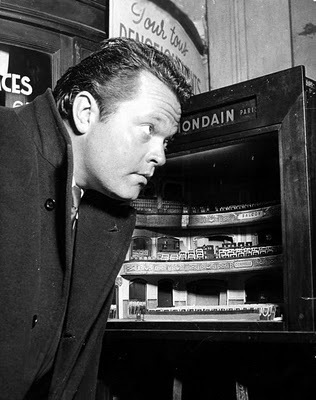
Ed here: The last time I talked about Orson Welles I got into some trouble. A few readers of the blog felt that I was denigrating him when I said that he was not a martyr but frequently the cause of his own trouble. I cited a tape I'd heard of him from the 1970s in which he was reading copy for the wine company he then represented. The tape was of the recording session itself with Welles doing various takes on the copy. He didn't like the direction he was getting and became so abusive and angry it almost sounded like a gag. He went out of his way to insult the ad agency people. And he kept it up. He was being paid a lot of money. There wasn't a better way to handle it? Jake Hinson at The Night Editor speaks to this and other Wellesian issues in a fine piece he recently wrote.
Jake Hinson:
By then, however, the money had dried up in Europe. Welles may have been a great artist, but he was never box office gold. He was barely box office bronze. He returned to America and took roles in films that were beneath him. He channeled the money back into his projects like THE OTHER SIDE OF THE WIND, a drama featuring John Huston, Peter Bogdanovich, and his buddy from his RKO days, JOURNEY INTO FEAR director Norman Foster.
He still dabbled in pulp and noir, too. He shot an adaptation of Charles Williams's DEAD CALM called THE DEEP with Laurence Harvey, working on it until Harvey died. He planned an adaptation of Jim Thompson's A HELL OF A WOMAN with director Gary Graver, but like almost all of his projects in the seventies and eighties, it had to be shelved for lack of funds. Hollywood, which had never liked Welles, had now forgotten him. He was old and broke in a town where only youth and money mattered. In 1985, at the age of 70, he died at home working on a script.
There is a heartbreaking bargain you have to make with Orson Welles. Much of his work—more than that of any other major director—comes to us in damaged shape. When you consider that he was making difficult films to begin with, the full picture begins to emerge.
Orson Welles was either too much of an artist or too much of an egomaniac—perhaps both—to ever fully commit to genre, even for the duration of a single film. He liked genre but viewed it as a beginning, a jumping off place. This was no less true for a thriller than for a Shakespeare adaptation. His instinct was to be, as he once angrily wrote Harry Cohn, "original, or at the least somewhat oblique." Win or lose—and he lost often—his films were stamped with the conviction that cinema was an instrument of experimentation and poetry, not formula.
for the rest go here:http://thenighteditor.blogspot.com/20...
Published on November 27, 2011 13:03
November 26, 2011
Forgotten Movies: Netflixing: Showtime's Rebel Highway (1994)
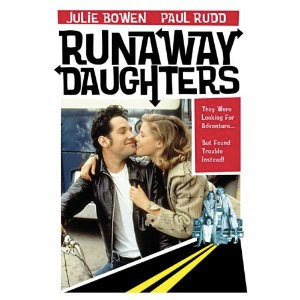
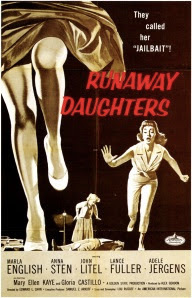
FROM TCM MOVIE MORLOCKS
Netflixing: Showtime's Rebel Highway (1994)
Posted by R. Emmet Sweeney on November 8, 2011
In one of the stranger experiments in cable television history, Showtime's 1994 Rebel Highway series commissioned ten filmmakers to remake a 1950s exploitation movie. It was the brainchild of Lou Arkoff (the son of American International Pictures founder Samuel Z. Arkoff) and Debra Hill (producer of Halloween). They gave directors $ 1.3 million and a 12 day shooting schedule, to roughly approximate the original shooting conditions (modified for inflation). Unlike the '50s cheapies, though, they were given final cut, and could choose their own screenwriter, editor and director of photography. This proved irresistible to the (mostly) impressive list of talents who signed on: Robert Rodriguez (Machete), John McNaughton (Wild Things), Mary Lambert (Pet Sematary), Allan Arkush (Rock 'N' Roll High School), Joe Dante (Gremlins), Jonathan Kaplan (The Accused), John Milius (Conan the Barbarian), William Friedkin (The Exorcist), Ralph Bakshi (Fritz the Cat) and Uli Edel (The Baader Meinhof Complex).
All of the filmmakers, except for Rodriguez, were old enough to have lived through the era of the film they remade, engaging the aesthetics and politics of the originals in strikingly different ways, alternating between affection and parody often in the same film. Since its original airing, the series has completely disappeared from cultural memory, but Netflix Watch Instantly, that haphazard repository of moving image detritus, is now streaming every entry, and it's well worth sampling the project's eccentric film-historical time travel. Below, some thoughts on my favorites.
Joe Dante's Runaway Daughters, an adaptation of Edward L. Cahn's 1956 AIP production, is one of the few entries to completely stand on its own as a feature. It is a companion piece to Matinee, Dante's loving evocation of a 1950s movie-huckster, modeled on William Castle, that he made the previous year. Both films were written by Charlie Haas, and share a tone of gentle satire, about the paranoia brought on by the threat of nuclear war and the space race, respectively. Runaway Daughters follows three high school girlfriends who chase down the no-good boy who loved and left. Working class Holly (Mary Nicholson) thinks she's pregnant, and is convinced by rich girl Angie (Julie Bowen from Modern Family) and middle-class Laura (Jenny Lewis, who later formed indie-rock band Rilo Kiley) to track the dog down. So they steal a car and hit the road, intercepting the cad before he signs up for the Navy.
Dante opens the film with an irony-drenched found footage montage set to "Let the Good Times Roll", from a jubilant Eisenhower and Nixon, to the NAACP hung in effigy, and closing with the repressed sexual longings of I Was a Teenage Werewolf (1957), the title character getting hairy while watching a stretching gymnast. The longing on-screen enters the narrative, as the trio of not-so-repressed girls is watching Werewolf at a drive-in, necking with impunity and ignoring the metaphors on screen. One of the neckees is Paul Rudd in one of his earliest roles, playing Angie's bad boy squeeze, Jimmy Rusoff (named after the original screenwriter, Lou Rusoff). Dante gifts Rudd with the catch phrase from Speed Crazy (1959, a major part of Dante's mash-up Movie Orgy ('68)), "Don't crowd me!", which Rudd dishes with appropriate petulance to his greasy gearhead Dad (played against type by Fabian, a late '50s teen idol).
for the rest go here:http://moviemorlocks.com/2011/11/08/n...
Published on November 26, 2011 11:32
November 25, 2011
New Books: ESCAPE FROM PARIS by Carolyn Hart, Oct. 2011 edition
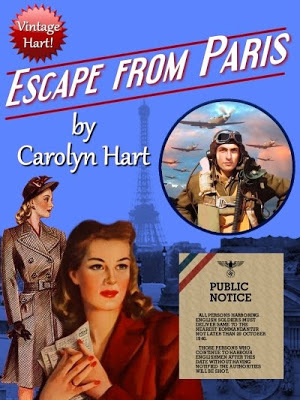
There are edits and there are edits. This book was first published in England in 1982. It came out with a word count of 55,000 words. The problem was the manuscript was 93,000 words. Now THAT's an edit.
Fortunately Oconee Spirit Press has now published the full version in a very natty trade paperback. Since we all know most of my synopses are terrible let me as usual I'll let the press release do the heavy lifting.
"ESCAPE FROM PARIS is the story of a year of war, the year France fell to the Germans and England awaited invasion. It is the story of people around the world, touched by war. It is also the story of two American sisters (Linda and Eleanor) in Paris who help British fliers from Occupied France. The Gestapo has decreed death for all involved in saving RTF fliers."
I wasn't sure what to expect when I started reading Escape but within four pages I was hooked. The book begins cleverly and powerfully with short sharp chapters focusing on various people in various places caught up in the war. Readers get a vital sense of a WORLD war right at the start.
Though the novel is rich with historical touches and insights the story is relentlessly told with numerous scenes of suspense perfectly set up and executed. From the psychotic German obsession with destroying Jews to the turncoat cooperation of the Vichy government to the underground movements (such as the one the sisters participate in) Escape is a non-stop thriller that a wide range of readers will not only enjoy but also remember.
Published on November 25, 2011 15:09
November 24, 2011
Buy Bill Crider's Book
Amazon.com: A Werewolf Named Wayne eBook: Bill Crider: Kindle Store: Al's new next-door neighbors have just arrived in a smoke-belching DeSoto convertible. They may travel in style, but there's more to them than meets their strangely eerie eyes. Things are going to get hairy as Al gets to know these new additions to the neighborhood. He's ready to face any challenges they bring--secret construction projects and cravings for canned dog food included. But first Al may have to answer a tough question: is it harder being friends with a werewolf, or a girl?
Hermie, Al, and Carl from Bill Crider's first young adult novel A VAMPIRE NAMED FRED, are back in action for another adventure in A WEREWOLF NAMED WAYNE - published for the first time ever.
Published on November 24, 2011 20:10
Ed Gorman's Blog
- Ed Gorman's profile
- 118 followers
Ed Gorman isn't a Goodreads Author
(yet),
but they
do have a blog,
so here are some recent posts imported from
their feed.



